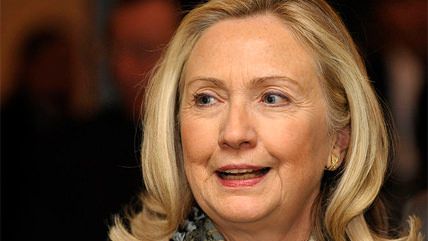Who Would Hillary Clinton Bomb?
She's rarely met a war she didn't like-or a constitutional limit she deems worth respecting.

Judging by the early reviews, former Secretary of State Hillary Clinton's new memoir, Hard Choices, is a cautious, poll-tested tome, drafted with an eye toward 2016.
But she says at least one interesting thing in the book.
On her 2002 vote to authorize the Iraq War, Secretary Clinton writes: "I thought I had acted in good faith and made the best decision I could with the information I had. … But I still got it wrong."
What a strange formulation! Was then-Senator Clinton dissociated from her own mental state in the post-9/11 fog of war? "I thought I had acted in good faith," but … I later found out my motives were base and mercenary?
Well, as the lady herself noted some 20 years ago, it's not easy to figure out "who we are as human beings in this post-modern age."
"What difference, at this point, does it make?" you might ask. Actually, Clinton's role in the worst foreign policy disaster in 30 years is highly relevant to her fitness for higher office.
In her October 2002 speech on the resolution, Senator Clinton declared: "the facts that have brought us to this fateful vote are not in doubt," among them, the vitality of Saddam Hussein's nuclear program and his record of harboring al Qaeda. But she wasn't interested enough in the facts to bother reading the National Intelligence Estimate on Iraq–portions of which cast serious doubt on those claims.
After her vote, Clinton embarked on a decade-long journey of self-discovery on Iraq. In 2004, she declared, "I don't regret giving the president authority," It wasn't a vote to go to war, anyway.
In 2008, she accused "Meet the Press'" Tim Russert of getting all "Jesuitical" when he pointed out that the measure she voted for said "Authorization for Use of Military Force Against Iraq Resolution of 2002" right there at the top. Still, Clinton maintained, "it was a sincere vote at the time"; now, however, she's not so sure.
I can't help Clinton in her Boomerish quest for authenticity, but her vote seems entirely consistent with her record. In her long career, she's rarely met a war she didn't like—or a constitutional limit she deems worth respecting.
In 2007, asked by reporter Charlie Savage about the limits of presidential war powers, candidate Clinton replied: "the Constitution requires Congress to authorize war. I do not believe that the president can take military action—including any kind of strategic bombing—against Iran without congressional authorization."
It's hard to credit that answer as "sincere." As first lady, Clinton played a key role in convincing her husband to bomb Serbia without congressional approval. For eight months after the Monica Lewinsky scandal broke, she refused to speak to her husband, until, in March 1999, she phoned him with a directive to attack.
"I urged him to bomb," she later explained.
As secretary of State, she urged President Obama to bomb Libya, congressional authorization be damned. If the results haven't been particularly pretty, at least Clinton got some amusement out of the war. Upon hearing that Gadhafi had been killed by a rebel mob, she cracked, "we came, we saw, he died."
I shed no tears for the "mad dog of the Middle East," but given that he slipped this mortal coil while being sodomized with a combat knife, that seems a little callous. At least we could hope for a secretary of state with a dash more decorum, one who avoids the rhetorical stylings of Julius Caesar.
But Clinton is to the Imperial manner born. And if she realizes her ambitions in 2016, she won't have to urge anyone else to bomb.
This column originally appeared in the Washington Examiner.


Show Comments (155)